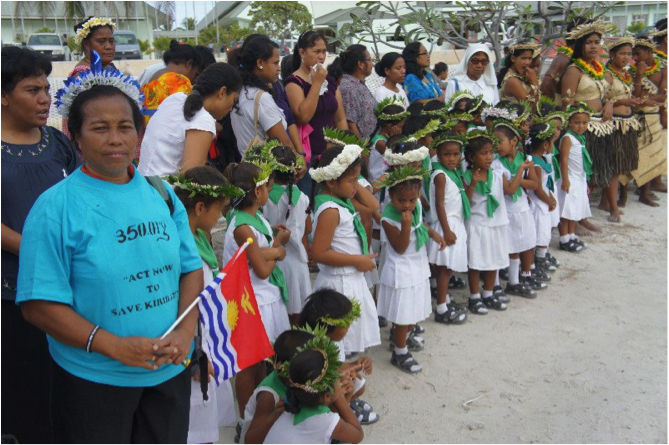My Banaban Experience
15 August 2011

Pelenise Alofa
President
Kiribati Climate Action Network
Kiribati
The Resettlement of the Banabans
Fiji is the hub of the Pacific. Our flights always almost have to stop over in Fiji for connections. While traveling through Fiji, I spent time with the Banabans, a minority race in Fiji. These people were resettled in Fiji in 1945 because the British Phosphate Corporation was mining phosphate on their island, Banaba. The rights to mine were given by illiterate Elders; no one at that time could read or write, so they were given fraud. Banaba today is almost completely mined, just over 1/10 of the island is left and most of the island is inhabitable. In simple terms: the people were displaced or resettled to Fiji because the British, Australians and New Zealanders (co owners of the company) valued money over the lives of human beings. There are negative and positive impacts of the resettlement of a total population of people. One of the negative impacts that the Banabans faced was their loss of fishing rights. The Banabans are fishermen by trade and culture. They love the ocean and fishing is a game they enjoyed. The resettlement in Rabi, Fiji, took away this right because the seas and ocean are owned by the Tui Cakau (Fijian Chief) and the Banabans have to buy licenses to fish. This is the Fijian right that the Banabans cannot take away from them, and the Banabans will always appreciate the kindness and hospitality of the indigenous Fijians.
Today, I relate CC negotiations to the experience of my own people, the Banabans. If nothing is done and the people get resettled, it is because CC negotiations is not about humanity, but economic development (money). The pursuance for development by most developed countries is not about sustainability for everyone, but the conspiracy by the few rich people.
The Banaban Elders & Landowners Association
The Banabans requested support and we worked together to establish an NGO called the Banaban Elders & Landowners Association. I wrote up their constitution which was submitted to the Ministry of Labour & Development in Fiji for endorsement. It was a privilege to be chosen as their Advisor and we meet every time I travel via Fiji. All this was done on voluntary basis. Note the name of the NGO. It’s the Banaban Elders. According to the Banaban culture, the Elders are leaders and most respected group in society. We have a political group, but culturally, it is the Elders that have the final word. The issues involved in this NGO are: children, youth and women’s development, climate change, good governance, economic sustainable development, care for the disabled, education and health, and culture and identity preservation. We distributed our constitution to the different regional organizations based in Fiji to know that our island does have an NGO working with the community.
The first workshop that the Banaban NGO attended was on climate change that was organized by 350.org. Today, the Banaban Youth is preparing for the national campaign in September 24. Their activity is to plant trees and to involve our politicians in the campaign. We will be doing this in Kiribati as well.
In addition, the Fiji Council of Social Services provided short-term courses for members of our NGO on elderly care, childcare, micro finance, and sewing. More than ten of our youth graduated from these courses last week. It was a great opportunity for many of our unemployed youth to build skills that could help them find jobs locally or overseas and also to provide support to their own families.
Furthermore, we organized three other workshops: virgin oil making, paper making, and flower and jewelry making. Many of our women are smart and skilled in handicrafts, but do not have a market. So during my two weeks stay in Fiji I was able to secure a shop for them in a town, Suva, and we have also secured markets for them in NZ, US, Nauru and Kiribati. The introduction of marketing calls for planting of commercial trees and this is related to CC adaptation. We will work on looking for funds towards this project. The Banabans have indeed crossed boundaries and are learning to do marketing to sustain their family income. It has been great working with the Banabans in Fiji.

